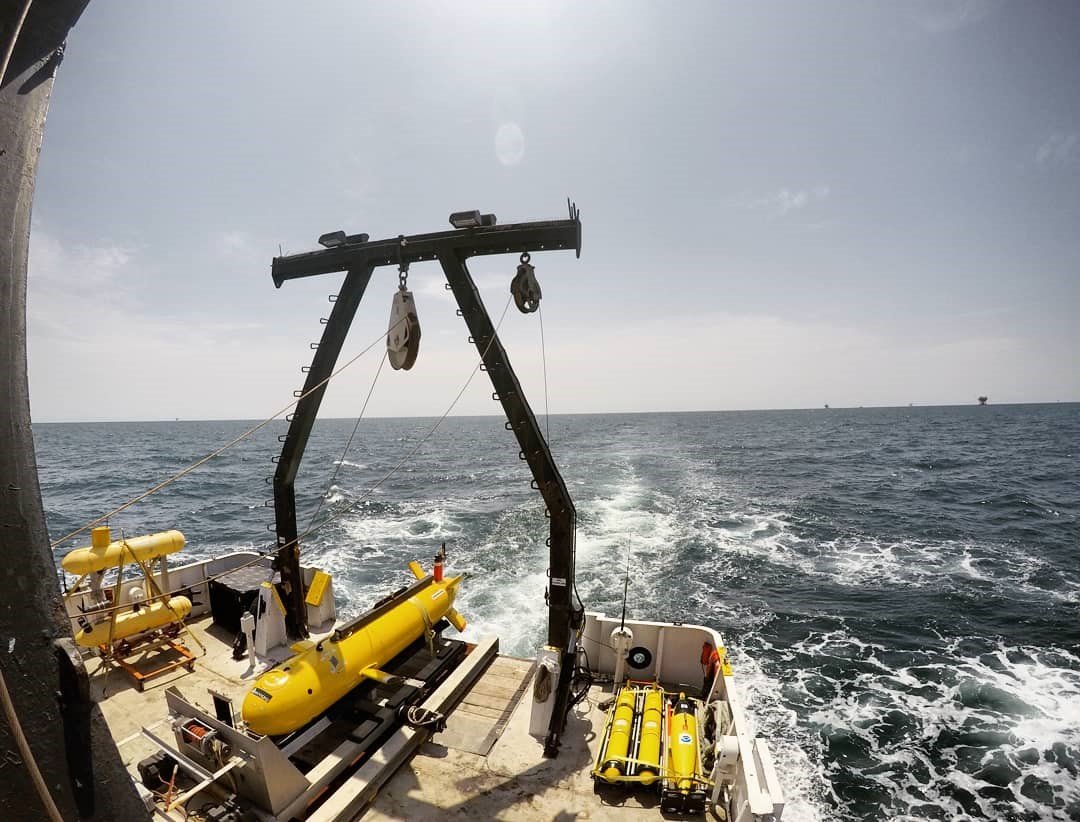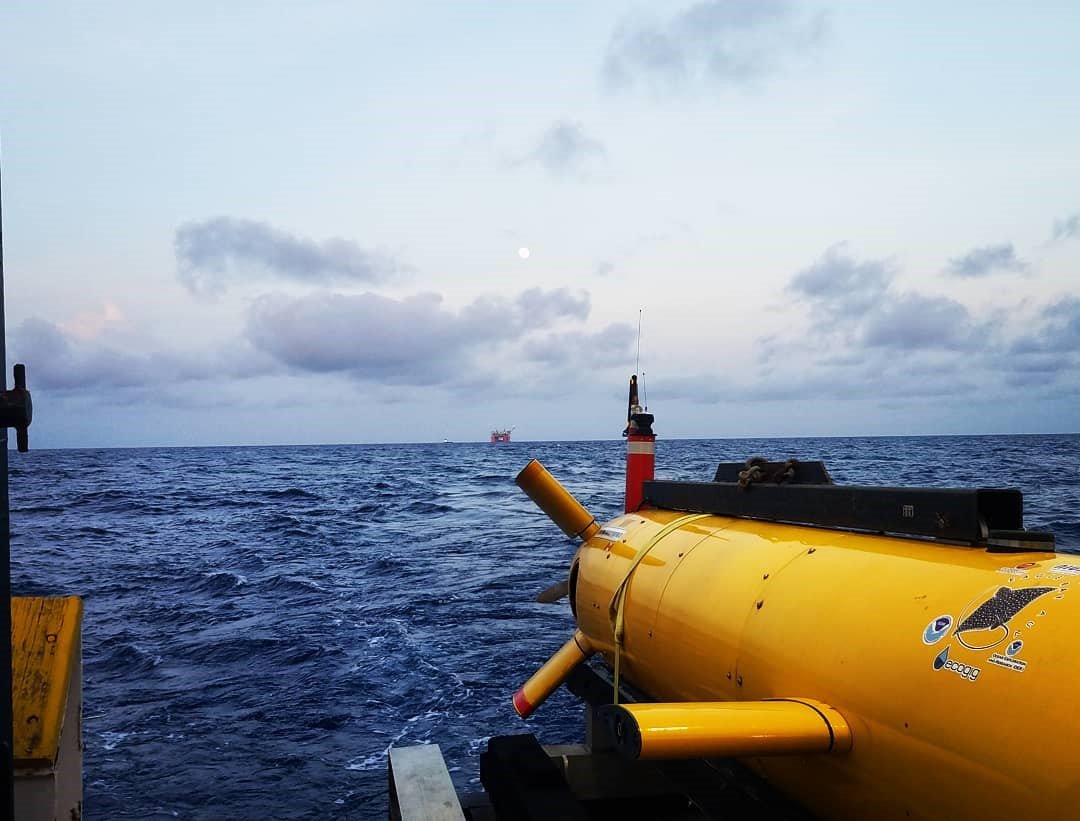The University of Southern Mississippi’s
Division of Marine Science
The ocean provides the air humans breathe, influences weather, regulates global climate, and provides vital resources that affects every aspect of our lives. Around 40% of the world's population lives within 60 miles (100 km) of the coast, making them particularly vulnerable to changes in sea level, coastal degradation, flooding, and the damaging effects of hurricanes. The ocean economy contributes more than 300 billion dollars annually and over 3 million jobs to the US economy. The marine environment is therefore vital to our planet and our well-being. Marine Scientists at USM study a broad range of research themes aimed at understanding ocean processes so that they may better understand the current and future role of the ocean in Earth systems, and better preserve and protect marine resources.
What do students in the Division of Marine Sciences study?
A working understanding of the four major fields of marine science: physical oceanography, geological oceanography, biological oceanography, and marine chemistry
A 'cross-discipline' appreciation of ocean processes and how they regulate global climate, marine ecosystems, and sustain global fisheries
A broad range of practical, analytical, and laboratory skills, including field work at sea, data analysis, and state-of-the-art instrumentation
How to effectively communicate science to a broad audience
The foundation provided by their program has consistently assisted their students in continuing their career paths in research, teaching, and other sectors around the country both at a university level as well as within federal agencies such as the Navy, NOAA, EPA, and USGS.
Master of Science in Marine Science
The School of Ocean Science and Engineering offers the Master of Science in Marine Science (M.S.) degree. The purpose of the M.S. program in Marine Science is to enable students to develop research, analytical, computational, writing skills, and a mastery of knowledge in specific fields in order to prepare students for technical and support positions in marine-related occupations in academic, government, and private organizations.
Minimum of 34 graduate hours with a 3.0 GPA or higher; 18 hours must be at the 600 level or higher.
Completion of a 10-day research cruise-field experience
Successfully pass the qualifying examination
Successfully pass an oral comprehensive examination
Completion of a thesis approved by the student’s thesis committee and the Graduate Reviewer
Successful public oral defense of the thesis by the graduate committee and any other faculty member(s) designated by the graduate dean
Doctor of Philosophy in Marine Science
The School of Ocean Science and Engineering offers a Doctor of Philosophy in Marine Science with specialization in a wide range of marine science fields, including biological oceanography, geological oceanography, hydrographic science, marine chemistry, and physical oceanography. The Ph.D. program emphasizes excellence in research. Qualified students holding either a bachelor's or master's degree in a relevant field of science, mathematics, or computer science are encouraged to apply for admission to the Ph.D. program.
Students must meet the general requirements set forth in the Graduate Bulletin of The University of Southern Mississippi. The Ph.D. in marine science entails a minimum of fifty-four (54) semester hours of coursework beyond the bachelor's degree or master's degree.
A minimum of 54 graduate hours beyond the bachelor’s or master’s degree with a 3.0 GPA or higher. (A Master of Science en route to Doctor of Philosophy in Marine Science track is available. Please consult the Division of Marine Science website for more information on this option.)
Completion of a 10-day research cruise-field experience
Completion of the research tools requirement
Successfully pass the qualifying examination
Successfully pass an oral and/or written comprehensive examination
Completion of a dissertation approved by the student’s doctoral committee and the Graduate Reviewer
Successful public oral defense of the dissertation by the graduate committee and any other faculty member(s) designated by the graduate dean
For more information on the M.S. and the Ph.D. in Marine Science, please visit: http://www.usm.edu/marine/marine-science-degrees .
Hydrography
Traditionally, the hydrographer has been associated with making the sea charts for navigation. This is still an important role but, as a science and profession, hydrographic surveying has developed into a multi-disciplinary occupation. The hydrographer is involved with every aspect of ocean data from bathymetric mapping of the ocean floor, managing large marine data sets, exploring for the minerals that lie far beneath, measuring currents, tides and waves, and observing the ocean environment.
USM’s Hydrography degrees comprise only 1 of 3 programs in North America that are Recognized by the International Board on Standards of Competence for Hydrographic Surveyors and Nautical Cartographers for technical professionals.
There are two hydrography related graduate programs at USM. One offers a Master’s in Hydrographic Science while the other offers a Ph.D. in Marine Science with an emphasis in Hydrography. The M.S. degree program in Hydrographic Science is a non-thesis degree program. Through the Ph.D. track, a doctoral thesis is completed under the advisement of a marine science faculty member.
What do students in Hydrography study?
Data mining for all existing spatially-related information for the project area
Planning, preparation, and development of Hydrographic Survey Specifications for the project area
Data collection (multi-beam, single-beam, side-scan sonar, tides, sound velocity, shoreline, navaids, etc.)
Data processing and analysis
Quality assurance checks to determine if international standards have been met
Electronic Navigational Chart production
Completion of a comprehensive Report of Survey meeting the standards of the current NOAA Hydrographic Survey specifications and deliverables
Presentation of the project and results to the examination committee
Master of Science in Hydrographic Science
The School of Ocean Science and Engineering offers the Master of Science in Hydrographic Science (M.S.) degree. The purpose of the M.S. program in Hydrographic Science is to provide students with technical and practical expertise in advanced hydrographic methods and standards that will enable them to assume leadership roles in using modern techniques in academic, government, military, and private organizations engaged in hydrographic activities.
For more information on the Master of Science in Hydrographic Science, please visit: http://www.usm.edu/marine/hydrographic-science-overview .
Doctor of Philosophy in Marine Science (Hydrography)
The School of Ocean Science and Engineering offers a Doctor of Philosophy in Marine Science with specialization in a wide range of marine science fields, including biological oceanography, geological oceanography, hydrographic science, marine chemistry, and physical oceanography. The Ph.D. program emphasizes excellence in research. Qualified students holding either a bachelor's or master's degree in a relevant field of science, mathematics, or computer science are encouraged to apply for admission to the Ph.D. program.
Students must meet the general requirements set forth in the Graduate Bulletin of The University of Southern Mississippi. The Ph.D. in marine science with an emphasis in hydrographic science entails a minimum of fifty-five (55) semester hours of coursework beyond the bachelor's degree or master's degree.
For more information on the Doctor of Philosophy in Marine Science (Hydrography), please visit: http://www.usm.edu/marine/marine-science-degrees .



